
Lumines: Puzzle Fusion is a 2004 puzzle game developed by Q Entertainment and published for the PlayStation Portable by Bandai in Japan and by Ubisoft elsewhere. The objective of the game is to arrange descending two-colored 2×2 blocks to create 2×2 squares of matching color. A vertical line known as the "time line" sweeps across the field, erases completed squares, and awards points. Each stage has a skin that affects the background, block colors, music, and the speed of the time line.
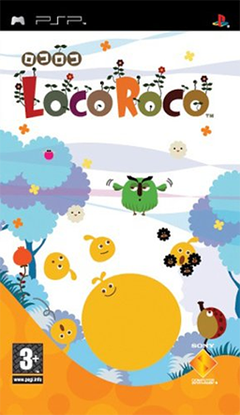
LocoRoco is a platform video game developed by Japan Studio and published by Sony Computer Entertainment, which was released worldwide in 2006 for the PlayStation Portable (PSP) handheld game console. The game was developed by Tsutomu Kouno, striving to create a game that was different from other titles being released for the PSP at the time. After demonstrating a prototype of the core gameplay to his management, Kouno was able to complete development over the course of a year and a half. In LocoRoco, the player must tilt the environment by using the shoulder buttons on the PSP in order to maneuver the LocoRoco, multi-colored jelly-like characters, through each level, being aided by other odd residents while avoiding hazards and the deadly Moja Troop, to reach an end goal.

NBA 07 is a basketball video game which was released on September 26, 2006. It was developed by San Diego Studio for the PlayStation 3 and PlayStation Portable versions and by A.C.R.O.N.Y.M. Games for the PlayStation 2 version. It is the second installment of the NBA series by Sony Computer Entertainment, and the first one for the PlayStation 3. It was one of three PlayStation 3 titles released at launch that supported the 1080p high definition video output. Kobe Bryant of the Los Angeles Lakers served as the cover athlete.
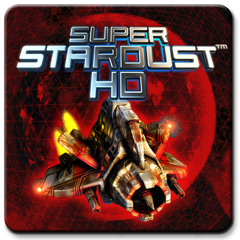
Super Stardust HD is a downloadable multidirectional shooter released for the PlayStation 3 by Sony Interactive Entertainment, developed by the Finnish company Housemarque. In Asian regions, it is known as Star Strike HD. In 2015, a port for the PlayStation 4, called Super Stardust Ultra, was released. In 2016, Super Stardust Ultra VR, a PlayStation VR compatible version that contains Super Stardust Ultra, was released for the PlayStation 4. It is also available as paid downloadable content for Super Stardust Ultra.

LocoRoco Cocoreccho is a platform game developed and published by Sony Computer Entertainment. The game released for PlayStation 3 via the PlayStation Network in September 2007. Described as an "interactive screensaver", LocoRoco Cocoreccho! features an autonomous two-dimensional environment in which the world and characters play even without input from the player.
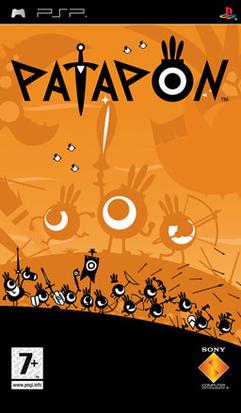
Patapon is a 2007 video game developed by Pyramid and Japan Studio and published by Sony Computer Entertainment for the PlayStation Portable (PSP). The game's unique genre was described to be a combination of rhythm and strategy. The game's concept and design were conceived when game designer Hiroyuki Kotani discovered the Patapon designs from French artist Rolito's personal website. The name Patapon was created by Rolito and was inspired by an old French word for "children". Kotani chose the name because it sounded similar to marching and drumming. It was released in Japan in December 2007 and in February 2008 for North America and Europe.
God of War is an action-adventure game franchise created by David Jaffe and developed by Sony's Santa Monica Studio. It began in 2005 on the PlayStation 2 (PS2) video game console and has become a flagship series for PlayStation, consisting of nine installments across multiple platforms. Based on ancient mythologies, the series' plot follows Kratos, a Spartan warrior who becomes the God of War and comes into conflict with various mythological pantheons. The earlier games in the series are based on Greek mythology and see Kratos follow a path of vengeance against the Olympian gods; the later games are based on Norse mythology and see Kratos go on a path of redemption while also introducing his son Atreus as a secondary protagonist.
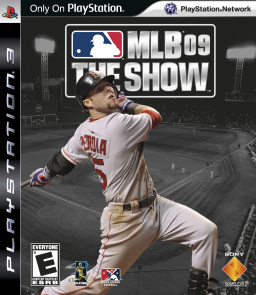
MLB 09: The Show is a baseball video game developed by San Diego Studio and published by Sony Computer Entertainment for the PlayStation 2, PlayStation Portable and PlayStation 3. It is the fourth edition of the MLB: The Show series, as well as the last to use THX technology. 2008 American League MVP Dustin Pedroia is the cover athlete.
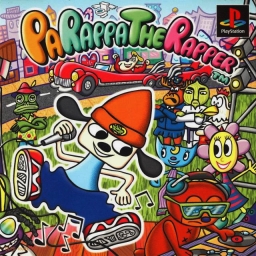
PaRappa the Rapper is a Japanese-American rhythm video game developed by NanaOn-Sha and published by Sony Computer Entertainment for the PlayStation in Japan in 1996 and worldwide in 1997. Created by music producer Masaya Matsuura in collaboration with artist Rodney Greenblat, the game features unique visual design and rap-based gameplay and is considered the first true rhythm game. It was ported to the PlayStation Portable in 2006 in celebration of its 10-year anniversary. A remastered version of the original PlayStation game was released for PlayStation 4 in 2017 for the game's twentieth anniversary.
Bluepoint Games Inc is an American video game developer based in Austin, Texas. Founded in 2006 by Andy O'Neil and Marco Thrush, the studio is known for video game remasters and remakes, such as Uncharted: The Nathan Drake Collection (2015), Shadow of the Colossus (2018), and Demon's Souls (2020). Sony Interactive Entertainment acquired the company in September 2021, making them a first-party developer for PlayStation Studios.

Lego Harry Potter: Years 1–4 is a Lego-themed action-adventure video game developed by Traveller's Tales and published by Warner Bros. The game is based on the Lego Harry Potter toy line, and its storyline covers the first four books by J.K. Rowling and its film adaptations in the Harry Potter film series: Harry Potter and the Philosopher's Stone (2001), Harry Potter and the Chamber of Secrets (2002), Harry Potter and the Prisoner of Azkaban (2004), and Harry Potter and the Goblet of Fire (2005).

LocoRoco Midnight Carnival is a platform game developed and published by Sony Computer Entertainment for the PlayStation Portable. The game was released in 2009 as a PlayStation Network exclusive, and is a spin-off that continues the story of LocoRoco 2.

MLB 10: The Show is a baseball simulation video game created by Sony Computer Entertainment's San Diego division. The MLB: The Show series of video games is the longest officially licensed baseball simulation game on the PlayStation. The game is made for Sony's own PlayStation 3, PlayStation 2, and PlayStation Portable. It is the direct successor to MLB 09: The Show, and was released on March 2, 2010. The game presents a number of new features, including catcher mode, and Home Run Derby.

Everybody's Golf Portable 2, known as Everybody's Golf 2 in the PAL region and Hot Shots Golf: Open Tee 2 in North America, is the eighth game in the Everybody's Golf series and the second to be released for PlayStation Portable. The game featured an online mode where up to 16 players were able to play on a single course. The servers shut down on 5 December 2011, making it impossible to play online since then.

LittleBigPlanet (LBP) is a puzzle platform video game series created and produced by British developer Media Molecule and published by Sony Interactive Entertainment. Most games in the series put a strong emphasis on user-generated content and are based on the series' tagline "Play, Create, Share". The tagline represents the three core elements of the series: playing alone or with others locally or online, creating new content using the in-game creation tools, and sharing creations and discoveries online with other players.
Sony has released a number of previously released PlayStation video games, remastered in high-definition (HD) for their newer consoles, a form of porting. A number of related programs exist, the most prominent two being "Classics HD" and "PSP Remasters". The former consists of multiple PlayStation 2 games compiled on one Blu-ray Disc. The latter are individual PlayStation Portable games republished on Blu-ray. These games are not direct ports, but remastered versions in high-definition, to take advantage of the newer consoles' capabilities. The remastering of the games include updated graphics, new textures, and Trophy support, and some of the remastered games released on PlayStation 3 have included 3D and PlayStation Move support. Some HD remasters have also been released individually or in bundles as downloads on the PlayStation Store; others are released exclusively as downloads.

Cladun: This is an RPG, known in Japan as Classic Dungeon: Fuyoku no Masōjin, is a 2010 action role-playing video game developed by System Prisma and published by Nippon Ichi Software for the PlayStation Portable. The game was released in Japan on February 18, 2010, in North America on September 20, 2010 and in Europe on November 17, 2010.

Wipeout Omega Collection is a 2017 futuristic racing video game compilation co-developed by XDev, Clever Beans and Creative Vault Studios and published by Sony Interactive Entertainment for the PlayStation 4. It was first released in North America on June 6 2017 and in Europe a day later.
Lumines is a puzzle video game series developed by Q Entertainment. The core objective of the games is to survive by rotating and aligning 2×2 blocks varying between two colors to form 2×2 squares of a single color which will be erased when the Time Line passes over them. The game is lost when the blocks reach the top of the playing field.

Corpse Party, released in Japan as Corpse Party: Blood Covered, is a horror adventure game developed by Team GrisGris and published by Xseed Games for Microsoft Windows. Originally developed as Corpse Party: NewChapter for Japanese mobile phones, it is a remake of the 1996 NEC PC-9801 video game Corpse-Party, and the second game in the Corpse Party series. Containing similar gameplay to its predecessor, players control a group of high school students who are transported to a haunted elementary school after performing a supposed friendship ritual, looking for a way to escape. Corpse Party is the first game in the series' rebooted continuity, introducing new characters and elements to those present in the original game, while generally following the same plot.













